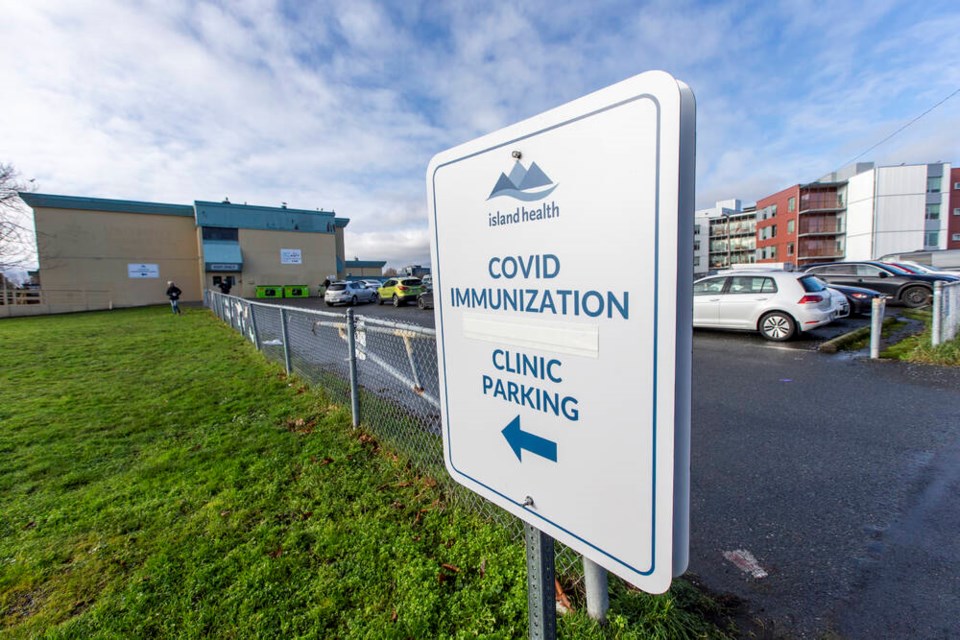If British Columbians don’t take steps to protect themselves from the more highly transmissible Omicron variant, COVID-19 cases in the province could exceed 2,000 a day by late December, and hospitals could be overwhelmed two weeks later, according to new pandemic modelling.
Omicron appears to spread more easily than the currently dominant Delta variant and increases the chance of re-infection in people who previously tested positive for COVID-19, as well as infection in fully vaccinated people, provincial health officer Dr. Bonnie Henry said Tuesday.
“We don’t know yet if Omicron will be able to evade the new defences that are given through vaccination,” said Henry. “What we do know is if cases go up, the percentage of people that end up needing hospital care go up as well.
“This is a time more than ever that we need to hold the line. We need to continue to do those things that we know work.”
A worst-case scenario would see Omicron surpass the Delta variant as the dominant strain in B.C, with transmission and ability to evade immunity as much as three times higher, and hospitalizations matching a previous daily high of 75 by Jan. 10.
In another possible scenario, Omicron could be just as, or less, severe than Delta. The scenarios do not account for booster shots, which will reduce transmission and severity of the disease.
There is “very limited” community transmission of Omicron in B.C., so “it’s too soon to say” if and when it will overtake the Delta variant, Henry said, adding that it’s hoped booster shots will slow Omicron’s pace.
As of Monday, there were 44 reported cases of the Omicron variant in B.C., including five on Vancouver Island. Four of the cases are related to University of Victoria off-campus gatherings that resulted in an outbreak that has infected at least 124 people.
Henry said Omicron cases here are associated with a UVic Vikes rugby team that played in the Canadian University Men’s Rugby Championship Nov. 24-28 at Queen’s University in Kingston, Ont.
The outbreak at UVic has been driven by the Delta variant, but the tournament spread Omicron to university communities across the country, said Henry. More cases are being tested and are expected to be confirmed, she said.
The modelling released Tuesday shows COVID-19 cases rising on Vancouver Island, driven by outbreaks at the University of Victoria as well as a religious gathering in the northern part of the Island. The reproductive rate of the virus — how many people a positive person passes the virus on to — is now above one on the Island, which is something that needs attention, said Henry.
Fraser Health, which has led in the number of daily cases, has a reproductive rate below one.
Of 519 new COVID-19 cases reported in B.C. Tuesday, 123 were in Island Health. There are now 804 active cases on the Island and public health is seeing greater spread of the Delta-plus variant, also known as AY 4, in the Island Health region, said Henry.
Data from November and December across B.C. show that unvaccinated people are seven times more likely than those with two doses of a vaccine to contract COVID-19. The unvaccinated are 30 times more likely to be hospitalized and 50 times more likely to need critical care.
Eighty-eight per cent of people age 12 and older in B.C. are fully vaccinated, and a little more than 610,000 boosters have been administered.
Of the approximate 350,000 children in the five-to-11 age group eligible for a low-dose pediatric COVID vaccine, 146,426 are registered and 73,457 have had their shot “but we need to get those numbers up,” said Henry. She cited 500 children in that age group infected with COVID-19 each week in the province.
Parents can register children through getvaccinated.gov.bc.ca or by calling 1-833-838-2323.
The 44 people infected with the Omicron variant in B.C. as of Dec. 13 range in age from five to 72, with a median age of 33. None are hospitalized, likely because those infected are mostly young and vaccinated, said Henry.
Henry is advising people to keep gatherings small now and through the holiday season.
“Rethink those parties, where you want to be together with groups of people you may not know. That is a risky thing right now. We need people to step back.”
Even within highly vaccinated populations, large gatherings are risky, said Henry, citing the 124 people who have tested positive for COVID- 19 at UVic.
Henry urged those gathering in limited numbers with close family and friends indoors to ensure the area is well ventilated — cracking open windows will help, she said.
Anyone age five and up is required to wear a mask in indoor public places, vaccination is mandatory in many workplaces, proof of vaccination is required for all non-essential indoor venues and events, and places of worship have limited capacity if all congregants aren’t vaccinated.
At UVic, where exams have been moved online because of the outbreak, students will soon have access to rapid COVID tests to be done every second day for 10 days.
While all of the initial cases of Omicron in B.C. were associated with travel, fewer than half are now travel-related.
The 20 travel-related Omicron cases involved several countries, including Nigeria, South Africa, Zimbabwe, Egypt, Iran, Mexico, Germany, Portugal and the U.S.
Seven of the 44 Omicron cases as of Dec. 12 were not vaccinated, including two children under age 11. The majority of cases, 24, are in the Fraser Health Authority.




